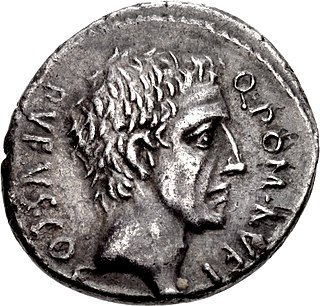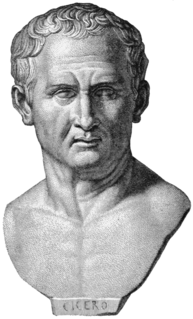Related Research Articles
Servius Sulpicius Rufus, was a Roman orator and jurist. He was consul in 51 BC.
The gens Sulpicia was one of the most ancient patrician families at ancient Rome, and produced a succession of distinguished men, from the foundation of the Republic to the imperial period. The first member of the gens who obtained the consulship was Servius Sulpicius Camerinus Cornutus, in 500 BC, only nine years after the expulsion of the Tarquins, and the last of the name who appears on the consular list was Sextus Sulpicius Tertullus in AD 158. Although originally patrician, the family also possessed plebeian members, some of whom may have been descended from freedmen of the gens.
Publius Sulpicius Rufus was a Roman politician and orator whose attempts to pass controversial laws with the help of mob violence helped trigger the first civil war of the Roman Republic. His actions kindled the deadly rivalry between Gaius Marius and Sulla, and provided the pretext for Sulla's unexpected march on Rome.
Gaius Aurelius Cotta was a Roman statesman, orator, priest, and Academic Skeptic; he is not to be confused with Gaius Aurelius Cotta who was twice Consul.

The gens Licinia was a celebrated plebeian family at ancient Rome, which appears from the earliest days of the Republic until imperial times, and which eventually obtained the imperial dignity. The first of the gens to obtain the consulship was Gaius Licinius Calvus Stolo, who, as tribune of the plebs from 376 to 367 BC, prevented the election of any of the annual magistrates, until the patricians acquiesced to the passage of the lex Licinia Sextia, or Licinian Rogations. This law, named for Licinius and his colleague, Lucius Sextius, opened the consulship for the first time to the plebeians. Licinius himself was subsequently elected consul in 364 and 361 BC, and from this time, the Licinii became one of the most illustrious gentes in the Republic.
Gaius Julius Caesar Strabo "Vopiscus" was the younger son of Lucius Julius Caesar and his wife Popillia, and younger brother of Lucius Julius Caesar, consul in 90 BC. His cognomen 'Strabo' indicates he was possibly cross-eyed, and the nickname 'Vopiscus' suggests he was a surviving member of a set of twins.
Pro Tullio is a partially preserved speech delivered by the Roman orator Cicero in 72 or 71 BC. The speech was made on behalf of Cicero's client, Marcus Tullius, who claimed legal damages from his neighbor, Publius Fabius, on the basis that Fabius had murdered several of Tullius' slaves in a property dispute.
Lucius Licinius Crassus was a Roman orator and statesman. He was considered the greatest orator of his day, most notably by his pupil Cicero. Crassus is also famous as one of the main characters in Cicero's work De Oratore, a dramatic dialogue on the art of oratory set just before Crassus' death in 91 BC.
Rufus is one of the most common of the ancient Roman cognomina.

De Oratore is a dialogue written by Cicero in 55 BC. It is set in 91 BC, when Lucius Licinius Crassus dies, just before the Social War and the civil war between Marius and Sulla, during which Marcus Antonius (orator), the other great orator of this dialogue, dies. During this year, the author faces a difficult political situation: after his return from exile in Dyrrachium, his house was destroyed by the gangs of Clodius in a time when violence was common. This was intertwined with the street politics of Rome.
Marcus Valerius Messalla Niger was a senator of the Roman Republic.
The gens Popillia, sometimes written Popilia, was a plebeian family at Rome. The first of the Popillii to obtain the consulship was Marcus Popillius Laenas in 359 BC, only eight years after the lex Licinia Sextia opened that magistracy to the plebeians.

The Philippics are a series of 14 speeches composed by Cicero in 44 and 43 BC, condemning Mark Antony. Cicero likened these speeches to those of Demosthenes against Philip II of Macedon; both Demosthenes’s and Cicero's speeches became known as Philippics. Cicero's Second Philippic is styled after Demosthenes' De Corona.
Publius Antistius was a Roman orator and senator. As tribune of the plebs in 88 BC, he rose from poorly regarded obscurity to prominence by delivering an exceptionally good speech in opposition to the irregular candidacy of a prominent senator to the consulship. In 86 BC, Antistius presided over a sham court which acquitted Pompey of a charge of embezzlement, and afterwards married his daughter to him. He adopted a careful political stance during the civil wars of the 80s BC, but was murdered by partisans of Marius at a senate meeting for suspected sympathy to the opposing faction of Sulla.

The writings of Marcus Tullius Cicero constitute one of the most famous bodies of historical and philosophical work in all of classical antiquity. Cicero, a Roman statesman, lawyer, political theorist, philosopher, and Roman constitutionalist, lived in 106–43 BC. He was a Roman senator and consul (chief-magistrate) who played a critical role in the transformation of the Roman Republic into the Roman Empire. A contemporary of famous Roman politicians such as Julius Caesar and Pompey, Cicero is widely considered one of Rome's greatest orators and prose stylists.
Tiberius Canutius or Cannutius was tribune of the plebs in 44 BC, the year of Caesar's assassination. As a supporter of the senatorial party, he opposed the triumvirs, resorting to military force during the Perusine War. He was captured and put to death by Octavianus in 40 BC.
Pro Quinctio was a defence speech delivered by Marcus Tullius Cicero in 81 BC, on behalf of Publius Quinctius. It is noteworthy as the earliest of Cicero's published speeches to survive.

Quintus Pompeius Rufus was a consul of the Roman Republic in 88 BC. His colleague in office was the future dictator Sulla.

Consolatio is a lost philosophical work written by Marcus Tullius Cicero in the year 45 BC. The work had been written to soothe his grief after the death of his daughter, Tullia, which had occurred in February of the same year. Not much is known about the work, although it seems to have been inspired by the Greek philosopher Crantor's ancient work De Luctu, and its structure was probably similar to a series of letter correspondences between Servius Sulpicius Rufus and Cicero.
References
-
 This article incorporates text from a publication now in the public domain : Smith, William, ed. (1870). "P. Canutius". Dictionary of Greek and Roman Biography and Mythology . 1. p. 597.
This article incorporates text from a publication now in the public domain : Smith, William, ed. (1870). "P. Canutius". Dictionary of Greek and Roman Biography and Mythology . 1. p. 597.